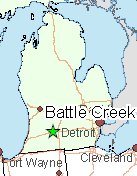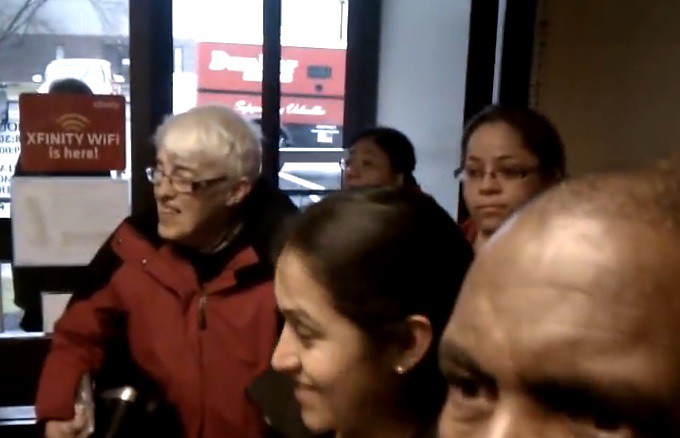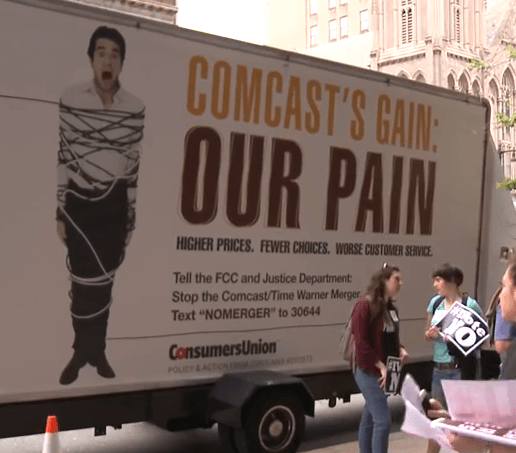[flv]http://www.phillipdampier.com/video/WZZM Grand Rapids Over 50 seniors displaced by fire at Battle Creek apartment complex 6-20-14.flv[/flv]
WZZM in Grand Rapids covers the fire in an independent living complex that left at least 50 seniors homeless and facing big bills from Comcast. (1:53)
 At least 50 seniors residing in an independent living complex in Battle Creek, Mich., were burned out of their apartments after a devastating fire in late June. Some of the fixed income seniors lost everything they owned.
At least 50 seniors residing in an independent living complex in Battle Creek, Mich., were burned out of their apartments after a devastating fire in late June. Some of the fixed income seniors lost everything they owned.
Despite the understanding and patience of credit card companies, banks, insurance companies, AT&T, and the local power utility — all willing to wait for payments or waive billing for those affected, one company stood out for its plan to collect damages from the fire victims: Comcast.
The Area Agency on Aging, working to help the victims, reached out to local Battle Creek media to report Comcast’s local agents were aggressively seeking compensation from the displaced seniors after learning about the fire.
“They want $120 for each cable box, despite the fact these seniors just lost their homes and many are low-income,” Carla Fales, CEO of the agency told WWMT-TV.
Comcast’s response: “Everything destroyed must be paid for.”
 As is often the case, once Comcast’s disagreeable behavior becomes a headline on the 6 o’clock local news, public relations damage control begins.
As is often the case, once Comcast’s disagreeable behavior becomes a headline on the 6 o’clock local news, public relations damage control begins.
When WWMT called Comcast’s corporate offices, the cable company assured the newsroom Comcast would probably waive the fees, but provided no guarantees.
“I can assure everyone there is a process in place; we are working individually with customers to help them in this difficult time,” offered a Comcast spokesperson.
Monday night, Battle Creek Mayor Dave Walters told WWMT that fire victims will not be held responsible for the cost of the lost equipment.
But some may be mired in paperwork to avoid the lost/damaged equipment fees.
Affected residents who were insured at the time of the fire still have to reimburse Comcast through a damage claim filed with their insurance company. Those uninsured will be asked to submit a fire report which must be requested from the local fire department. In some cases, customers may also asked to offer a notarized statement indicating they were not insured to avoid the $120 charge.
But before any of that happens, Comcast also traditionally requires customers to pay any past due balances on their account before equipment credits can be provided.
Comcast’s zeal for charging penalties for lost or damaged equipment is not limited to Michigan.
 In January, a Tennessee woman’s home went up in flames and was quickly declared a total loss. The only company to give the family a hard time was Comcast, who billed them $550 for four used cable boxes and a rented cable modem melted in the fire.
In January, a Tennessee woman’s home went up in flames and was quickly declared a total loss. The only company to give the family a hard time was Comcast, who billed them $550 for four used cable boxes and a rented cable modem melted in the fire.
“I thought, ‘What are they trying to do to me?'” Emma Hilton said. “I’ve done went through a fire. I tried to salvage what I can.”
Hilton was unsure what exactly Comcast expected the fire department to do about the cable company’s equipment.
“(Firefighters) couldn’t get the TV’s. They were burning,” she told WJHL-TV.
Despite the fact her landlord leveled the rest of the uninhabitable home, Comcast still wanted to get paid if she could not recover the equipment from the ashes.
“You mean they’re actually going to charge me for those cable boxes and after I told you I had a fire?'” Hilton said of one of her phone conversations with the cable provider.
Comcast told her to read the contract, which leaves responsibility for the cable equipment entirely up to the customer. Comcast includes a strong recommendation to keep up a renter’s or homeowner’s insurance policy. Now customers know why.
In the past six years of covering these stories, Stop the Cap! has found many renters who simply don’t bother with renter’s insurance, mistakenly assuming the landlord’s own insurance policy covers their damages. But it does not. A renter’s insurance policy typically costs about $100 a year and covers the renter’s personal belongings (and cable boxes). Some policies also cover displaced living expenses — food, a hotel room, etc. They also cover liability in the event a guest is injured inside your rental property. Some cable companies demand up to $500 for each lost or damaged piece of equipment — an unnecessary point of stress and expense right after a major negative event. Get insurance. It’s a bargain.
[flv]http://www.phillipdampier.com/video/WWMT Grand Rapids Seniors Asked to Pay Comcast for Damaged Boxes 6-20-14.flv[/flv]
WWMT in Grand Rapids covers Comcast’s initial resistance to giving seniors a break on fire-damaged cable equipment after their senior living complex was heavily damaged in a fire. (1:38)


 Subscribe
Subscribe




 Powell and others made certain that Internet Service Providers would not be classified as “common carriers,” which would require them to rent their broadband pipes at a reasonable wholesale rate to competitors. The industry and their well-compensated friends in the House and Senate argued such a status would destroy investment in broadband expansion and innovation. Instead it destroyed the family budget as prices for mediocre service in uncompetitive markets soared. Today, consumers in common carrier countries including France and Britain pay a fraction of what Americans do for Internet access, and get faster speeds as well.
Powell and others made certain that Internet Service Providers would not be classified as “common carriers,” which would require them to rent their broadband pipes at a reasonable wholesale rate to competitors. The industry and their well-compensated friends in the House and Senate argued such a status would destroy investment in broadband expansion and innovation. Instead it destroyed the family budget as prices for mediocre service in uncompetitive markets soared. Today, consumers in common carrier countries including France and Britain pay a fraction of what Americans do for Internet access, and get faster speeds as well.
